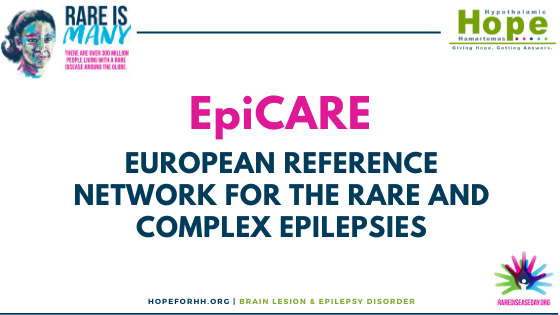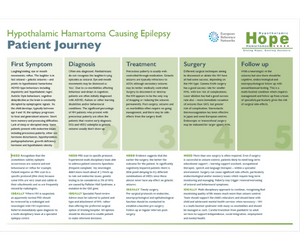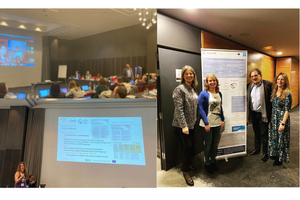
Introduction
Emma Nott, Hope for Hypothalamic Hamartomas board member, represented our community at the recent EpiCARE Annual General Meeting held in Lyon, France between 16-18 February 2022.
What is EpiCARE?
EpiCARE is the European Reference Network (ERN) for rare and complex epilepsies. Formed in 2017, it is a network of highly specialized health centers across Europe: members must have demonstrable expertise in rare and complex epilepsies. The centers collaborate too with scientific societies (ILAE, EAN, EPNS, Epilepsy Alliance Europe) and a number of other specialist epilepsy groups within the European Union. EpiCARE provides a coordinated approach for epilepsy diagnosis and treatment – for example by the collaborative use of e-tools and through cross-country consultancy. Different EpiCARE epilepsy teams (eg surgical, neuro-imaging, neuropsychological, neuropathological, etc) meet at least monthly online or face-to-face to discuss cases. They try to identify the best specific diagnostic tool and treatment, they share good practices and experience, they develop research projects, they deliver training. Bringing the pre-eminent thinkers in the field of epilepsy together, ERN EpiCARE aims to provide patients, their families and physicians with the best expertise available.
The network began with 28 full members and 15 affiliated partners from 24 European countries; its success was such that when membership was reviewed by the European Union after the first five years, 27 new centers applied, with about half being rejected. Professor Alexis Arzimanoglou, the coordinator, explained to the unsuccessful applicants,
“EpiCARE considers the epilepsies are an “ensemble” of complex diseases – expressed at all ages by the same symptom, epileptic seizures – despite the huge number of the underlying pathologies and/or aetiologies. Consequently, medical teams applying for full EpiCARE membership are expected to have expertise in the majority of these epilepsies (including pre-surgical evaluation; if surgery is not available on-site, an established regular collaboration and monthly participation at epilepsy surgery multidisciplinary meetings), so to be able to provide expertise, optimal diagnosis and treatment facilities not only at a national level but a cross-borders large expertise at the service of EU patients… New members of EpiCARE are expected to represent a clear added value at the service of patients across the EU.”
This emphasizes the high level of expertise and commitment required of member institutions. As of February 2022, there are now 38 full members and 12 affiliated partners across 28 European countries.
The Role of ePAG
Despite Brexit, UK expert centers are still included in the EpiCARE network, and Hope for Hypothalamic Hamartomas (UK Affiliate) is a member association – which is how we became a member of the ePAG – EpiCARE’s Patient Advocacy Group. The golden thread running through the European Reference Networks is the importance of the patient voice – it is the job of the ePAG to ensure that the patient is prioritized at all levels and at every stage. We are representatives from individual patient organizations supporting both pediatric and adult rare and complex epilepsy communities; we work collectively to help inform the medical and scientific community about the patient journey.
Relevance to the Hope for HH Community
Although in our participation we represent the HH community, on the ePAG we represent the whole spectrum of rare epilepsies. Nevertheless, some of the EpiCARE initiatives informed and facilitated by our contribution relate specifically to HH – including the creation of the following downloadable resources:
- ‘Understanding Each Step of the HH Patient Journey’
- ‘Hypothalamic Hamartoma Syndrome – 10 FAQ’s: Patient and Caregiver Leaflet’
- ‘Hypothalamic Hamartoma Syndrome – Information for the Healthcare Professionals Leaflet’
 In addition, an e-learning module on HH has been developed to educate the clinician in how to diagnose, treat and manage HH and its comorbidities.
In addition, an e-learning module on HH has been developed to educate the clinician in how to diagnose, treat and manage HH and its comorbidities.
In July 2020 the ePAG presented a live webinar explaining who we are, what we do, and inviting input – if you register you can view it here. On 14 April 2022, there will be a live webinar dedicated to HH – we are very pleased to have accepted an invitation to represent the HH patient community in that online seminar. To participate in this upcoming webinar register here.
Through EpiCARE, the patient advocates for genetic epilepsies were invited to co-author a research paper for the European Journal on Medical Genetics. Our submission is currently going through the final stages of the peer-review process and is scheduled for publication later this year – look out for the section dedicated to HH, co-authored by Professor Michael Hildebrand of our Medical Advisory Board.
Annual General Meeting Lyon, France February 2022

The Lyon 2022 annual meeting was the first EpiCARE meeting since the expansion of the network; it focused on bringing the new member institutions up to speed and on setting an agenda for the next five years. The mood was optimistic and collaborative; the discussions were lively and productive. Through the three ePAG representatives attending in person – as well as several more zooming in from home – we ensured that the patient presence was felt at every discussion and in every break-out group.
The last five years have been extraordinary in many ways, with the international pandemic preventing face-to-face collaboration while speeding up the technological improvements necessary to ensure fast and competent cross-country liaison. Although EpiCARE has spent much time over its first five years finding its feet and its place within the European Union’s Rare Disease Networks, an extraordinary amount has already been achieved in those five years. A strong network has been created, professional friendships have been made and strengthened, complex epilepsy cases have been reviewed and given the benefit of considered expert advice that is simply not available in the typical primary care hospital – and often not in the patient’s home country. There is every reason to hope and to believe that the continued productivity and generosity in the pooling of ideas and resources will lead to significant and tangible improvements over the next five years for those living with rare and complex epilepsies.





